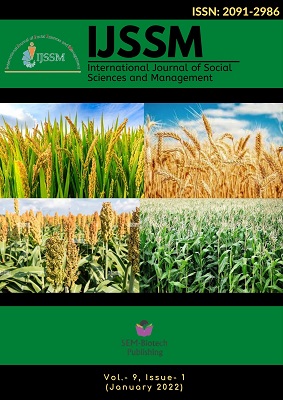A Geographical Perspective on Poverty-Environmental Degradation
DOI:
https://doi.org/10.3126/ijssm.v9i1.40464Keywords:
socio-economic development, rural poverty, quality of life, agricultural schemesAbstract
Environmental degradation is a process in which the natural environment is negotiated by declining environmental health and the biological diversity. The environmental health problems and urban poverty has a strong bond between them. The high use of non-renewable resources and the destruction of key renewable resources are the major contributors of environmental degradation. The poor people alone cannot be blamed as the key contributors of environmental degradation. In many areas the poor people are more aware about the proper use of natural resources like land, forests and water resources, as they get their livelihood from these resources. This paper focuses on the understandings prevalent on the topic of poverty and environmental degradation and cross-examines the geographical literature available on the subject. The broad objective of this paper is to examine the various contributors which acts vital role in the environmental degradation. The article provides a particular attention towards the poor as one of the elements of environmental deterioration. The analysis depicts that the institutional and market failures encourage unsustainable actions which pushes some income groups into poverty. The conflict among different income groups are the main culprits of poverty-environment degradation nexus. The environmental degradation, on the one hand, contributes to poverty through different agents which effects the human health and depletes the productivity of those natural and manmade resources upon which the poor are dependent, on the other hand, the poverty restricts the poor to perform such activities that will lead to damage the environment.
Int. J. Soc. Sc. Manage. Vol. 9, Issue-1: 1-7.
Downloads
Downloads
Published
How to Cite
Issue
Section
License
Copyright (c) 2022 International Journal of Social Sciences and Management

This work is licensed under a Creative Commons Attribution-NonCommercial 4.0 International License.
This license enables reusers to distribute, remix, adapt, and build upon the material in any medium or format for noncommercial purposes only, and only so long as attribution is given to the creator.




